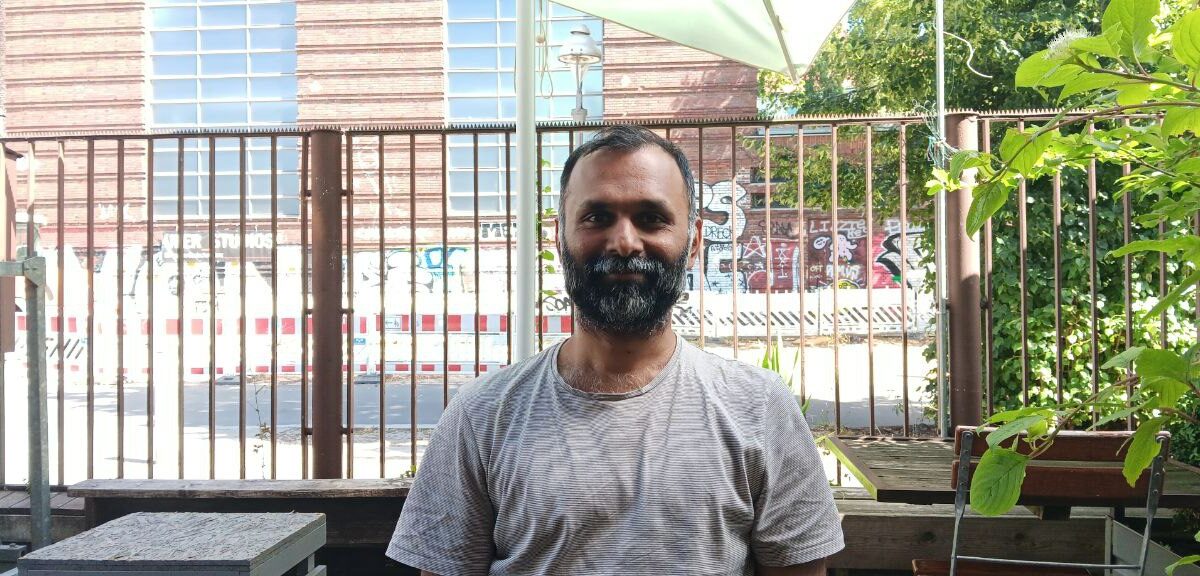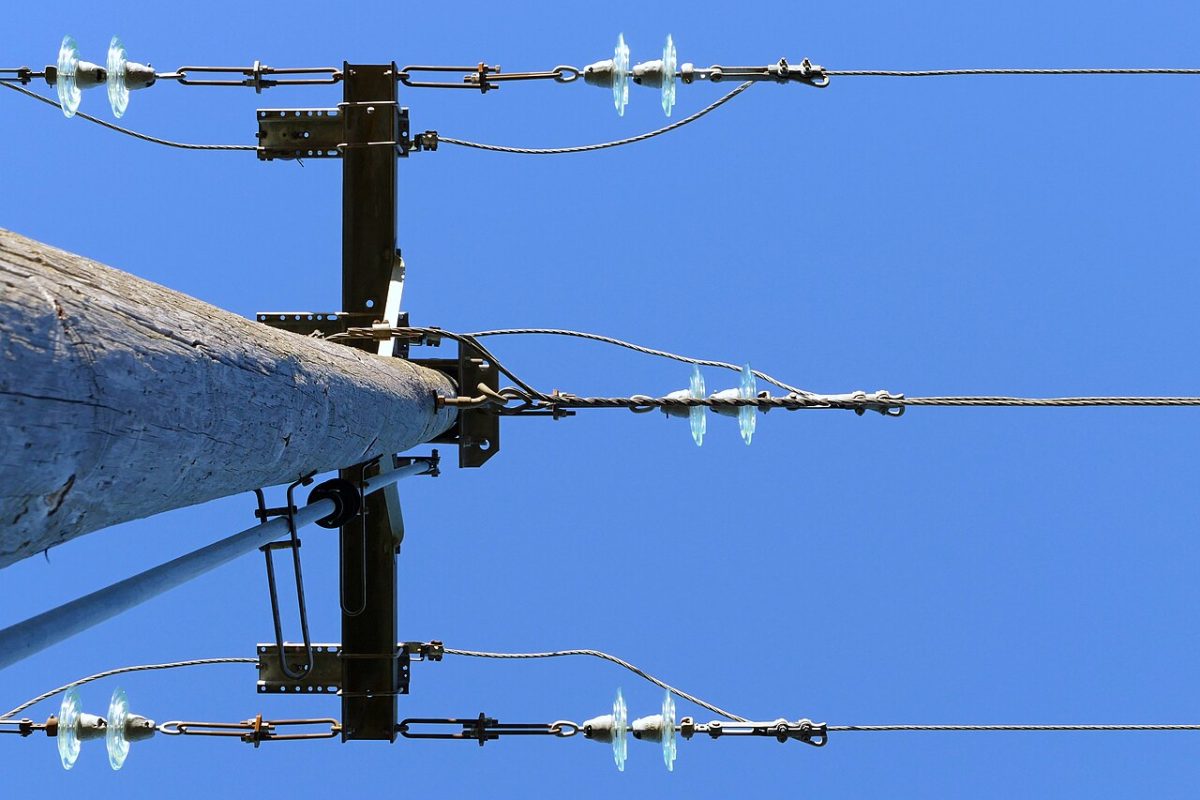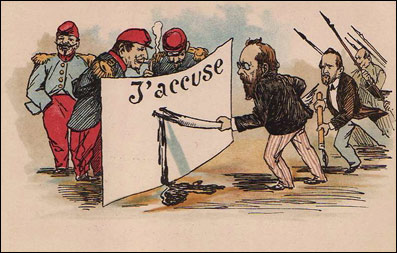Hi. Thanks for talking to us. Could you start by briefly introducing yourself?
My name is Kumar Muniandy. I’m from Malaysia, and my grandparents were taken by the British from India. They were displaced in Malaysia for colonial work as rubber tappers. My parents were born as first generation Indian Malaysians. I’m second generation.
I moved to London when I was 23 and wanted to be an actor. I stayed there for 17 years, went to drama school, but didn’t really succeed as an actor for many reasons. I left the UK a few years ago, travelled around a bit, and all my friends said Berlin would be the cheapest city to move to.
Next week, you’ve got a play on at the English Theatre Berlin. What’s the play about?
It’s a story about an Indian Malaysian queer gay guy who goes speed dating and meets five men. And through this conversation with five different men, we get to see gradually what he’s actually going through. Not to give too much away, but he hadn’t opened up to his late mother that he’s gay.
And he blames himself for his mother’s death. A guilt he carries on his shoulder since her passing. But at the end of the play, he opens up to his mother out in the open. But the juicy part is the conversations with these five men. You need to come and watch it to experience these moments.
And the play’s a comedy?
Yeah.. people laugh.
It’s a comedy about racism, homophobia and colonialism? Do you think these subjects can be funny?
Yes. I think it depends what state of mind you are in, and what kind of positionality you hold in the place you are. I always think about survival mode, like many people who toil all their life to belong somewhere. I think if I was in London, I would be less stressed, less powerless, because I know the language. I can speak freely. I can defend myself.
But here in Berlin, my B1 level German is not good enough. It’s sometimes difficult, whether it’s a mild or intense (all the -isms) situation, I have to protect myself.
I used to shout back and complain whenever people were rude or treated me unfairly, always pointing out their behaviour. But that only made things worse for me – it fired back in many forms – cancellations, blacklisted, labelled as violent, etc. So now, I’ve switched tactics and use humor instead.
I make the situation comical when some people joke about colonization, my skin colour, why Indians ‘shake their heads’, and are slightly racist to me without even realising. Most of the time, I feel powerless because the existing system does not adequately support people from minority backgrounds, who are not in the status quo. This can make it difficult for us to feel secure and have our voices heard.
And I pass (and benefit) as a cis looking man (even though I don’t identify myself as a cis man) and I’m brown – and it is already tough to navigate the system here so I can’t imagine for other marginalized folks who don’t pass as cis and have rich melanin skin dealing with the system. So yeah, I make jokes now.
You say it’s partly a language thing. Are there other aspects of racism which are specific to Berlin and Germany?
Yes. I often talked about and (attacked) white people, white people, white people. But before we even move to white people, I look at my own South Asian community, which has its own racist discrimination, which derives from colonization (caste, colourism, nepotism and so on..).
For example, when I’m in Malaysia, people have said to me to go back to India, but when I’m in India some have said: “oh you’re not really Indian because you’re Malaysian”. It’s the same thing that happens here but in another form of disassociating me from ‘them’.
It’s not just about race and colonialism. You’re also talking about the gay experience. There is a point of view, which you often hear, that gay men and women from the Global South are particularly repressed, because they’re not as enlightened as the West. Is this your experience?
I would say yes, and no, but can I answer the question in a different way?
The only place that I feel that I don’t have to justify my existence, is if I go to a queer BIPOC spaces, and among the LGBTQAI community. I’m gay, I like men. And I can just walk in and don’t have to prove it to anybody. I just get accepted. It’s the same thing when I go to a cinema. I’m just watching a film. We’re all equal watching a film. In the context of queer spaces among the LGBTQAI community, I can’t exist fully in Malaysia as there aren’t safe spaces like in Berlin or London, from my experience.
So yes, this is a huge part of freedom here. When I go home to look after my parents every year, I have to be in the closet, and pretend to be macho. Here in Berlin, there is freedom but one pays the price for having a rich melanin skin. You get exotified but you also get vilified at the same time. A friend once told me this and it has stuck in my head forever: ‘we are like dogs on a leash’. Gassi gehen oder…?
We’re in a room with a lot of elephants in it. One of them is the strangeness in Germany since October 7th. Have your experiences changed? Society seems to have gone mad. Has this affected you?
Yes, definitely. I think I’ve gotten more depressed, I am floating between feeling guilty, feeling lucky and some feelings that I don’t know how to identify and deal with. I get to fly home and be with my parents since my country is not getting bombed. My parents are going through challenging health conditions, and I have the opportunity to look after them. I have those blessings.
Here in Berlin, I try to focus more on supporting other countries like Myanmar, Congo, Sudan, Kurdistan, to name a few, those causes which don’t get as much press and solidarity as others. I go to screenings, try to help with donations or be there for an individual who’s from these countries.
You’re not Palestinian, but you are a brown person in Berlin. Has the way you’ve been treated in the past year changed?
No. I think it hasn’t changed. There’s always been prejudice against me because of my skin colour when I enter a space. I talk about this in the play, which are all real incidents which happened to me.
I’ll give you an example. When I was in London in 2003 the Iraq war started. Because I’m brown and look like a Middle Eastern man, I was stopped and questioned every day. They didn’t believe that I was an actor going to a drama school.
At the airport in London, security would always check me. It happened in Germany as well. And I looked at other brown guys going in. And there were some who were also queer (I think?), and they were really proud of themselves, confident and wore clothing that didn’t look like a cis straight men, you know, with earrings, headphones, scarves, nail polish and really fun confident looking. And they were never checked.
I thought, I’m going to do the same thing and see what happens. And you know what? I was not checked either. So whenever I fly home, I wear my skinny jeans and tight t-shirt. I try to put on a fake earring or a headphone, and pretend that I’m a really cool person. I am already an effeminate person, but I just extend it. And they don’t touch me. They don’t even check my bag.
(Disclaimer: This is based on my personal experience at airports I’ve been to and may not reflect everyone’s situation. I don’t intend to suggest it’s always the case for people who express themselves through clothing and appearrances).
Why do you think this is? I can see a line of thought that security thinks that all brown people are Islamists, but they also think that no Islamists are gay. So it must be confusing to them.
I guess. But interestingly, I was at a dinner party two years ago, and I was telling this to a group of people and there was this guy called Chris from America. I told them that I had to learn to be really queer gay looking at the airport and how it was successful to not get racially profiled through bag checks.
And he said, “lucky you. We are Black. We have no way out. It doesn’t matter if we’re femme or not, we still get racially profiled”. And that put me in my place and I realised sometimes I have advantages that others don’t have.
Let’s talk about the play a little bit. What is the role of Art in talking about society?
As an actor, I’ve usually just been asked to play terrorist roles, or a shopkeeper, problematic Muslim dad, Indian Yogi rapist harassing white women, these kinds of roles, with a thick Indian accent. I was never able to play a lawyer or whatnot. I think it’s important for people to see the reality of other people.
To be honest with you, I was just so tired of not getting any acting jobs. I have a mentor but also a good friend, she’s a Nigerian British artist who lives here and London, and I spoke to her about my idea for a play. And she said: “just write it”. And some good friends in the Berlin free scene stepped in as well and encouraged me to write and show the play. Through this process, I realized, I just want to say something.
My aim is not to be amazing on stage or show how good an actor I am. I just want to say something and leave. And people related to it, both white people, BIPOC folks. I think we need new voices. I guess there’s more exposure than before, but we need even more.
There’s a belief that the theatre world tends to be white and middle class and has certain assumptions. How true is that belief?
Five years ago, I would say yes, but now there are other demographics coming in. There are so many theatres in Berlin which are focussed on special causes and identities. Staatstheater is definitely white and middle class, but the free scene in Berlin, the small fringy type theatres are different.
But I still think that these spaces are more available to white queer, or white passing communities than BIPOC folks in the name of moving away from heteronormative patriarchy. It’s still dominated by white queer folks.
But you think that the rise of white queer people brings other people in in their wake? Why do you think things have gotten better in the last five years?
Yes and no. Because of George Floyd. Everything kind of kicked off from that. But it was just temporary, and it’s gone back down to the same usual shit. All the people who screamed Black Lives Matter and about inclusions were only there for three minutes. People who talked about inclusion are the ones who are still getting the jobs, opportunities. It’s still the same.
The other thing is funding. If you have funding then the theater will give you the space to do your thing. I would say that things have improved a tiny bit, but only a tiny bit. There is still alot of nepotism and tokenism under the name of inclusion and diversity.
How is the play going?
The crowd seems to really relate to what I’m saying. The character I’m playing is also problematic himself. So I’m not just showing victimization or he’s an angel, but that it’s from both sides. I think people appreciate that.
Do you think it’s dangerous to portray a minority character with flaws?
For me, theatre or film is about showing human flaws and private thoughts in a public place. I am more interested in portraying people’s flaws and my aim is to heal. Everything is kind of flawed and three dimensional. I want to show that but at the end, I want to convey healing – that’s what is important for me right now.
What happens next? Do you want to take the play to other places? Do you want to write a new play?
I did a play called White Talcum Powder, which I performed here in the Ufer Studios, it’s in development. Most British people who come to see the Second Class Queer play said “this has to come to London”. So I’m going to London in July to find a theatre – wish me luck – so far no lead.
Any chance of future plays or do you first need to relax?
I’m not getting any younger. I will strive to do more work. I’ve written a few things. I think artists in Berlin (or artists in general) have tons of work under their pillows. It’s all about resources, funding, opportunies – if you get it or not.
Even when I’m relaxing, I’m still writing or finding ideas. I don’t have the luxury to relax. I have no stable income and I’m looking after my parents. I come from a colonized and homophobic country.
Like other folks who are in the same situation as me, the oppression and colonisation DNAs are still operating. It will never leave. So I need to do the work to stop that in one way or another. This is why my play is called Second Class Queer. I’m a second class citizen in Malaysia. But I’m a second class queer in Germany.
If people go and see your show and like it and want to see more, how can they encourage the theatre community to book you?
I’m going to put up flyers on the wall with a QR code, email address, and Instagram account. You can take a picture, or fill out the questionnaire and email me about it. Or you can also just email the theatre and encourage them to put the play on again next year.
I want to translate the whole play into German and play it auf Deutsch next year. But that needs money/funding. When I hire people, I want to pay them well. The aim is to rewrite the play to suit the German audience and to poke some buttons. I think it will work.
Do you have ideas what those buttons would be?
Not yet because I need German born/naturalised folks to collaborate with me and talk about it. I understand the politics here and there, but my experience is different from the BIPOC German experiences. I want to get their opinions, experience but also mix with the Berlin/Germany’s diaspora’s realities in the German version of the play. We’ll see.
So, of people want to send you feedback then they should?
Definitely. Yeah.
Second Class Queer is showing at the English Theatre Berlin from Thursday 4th – Saturday 6th July. You can book tickets here.




